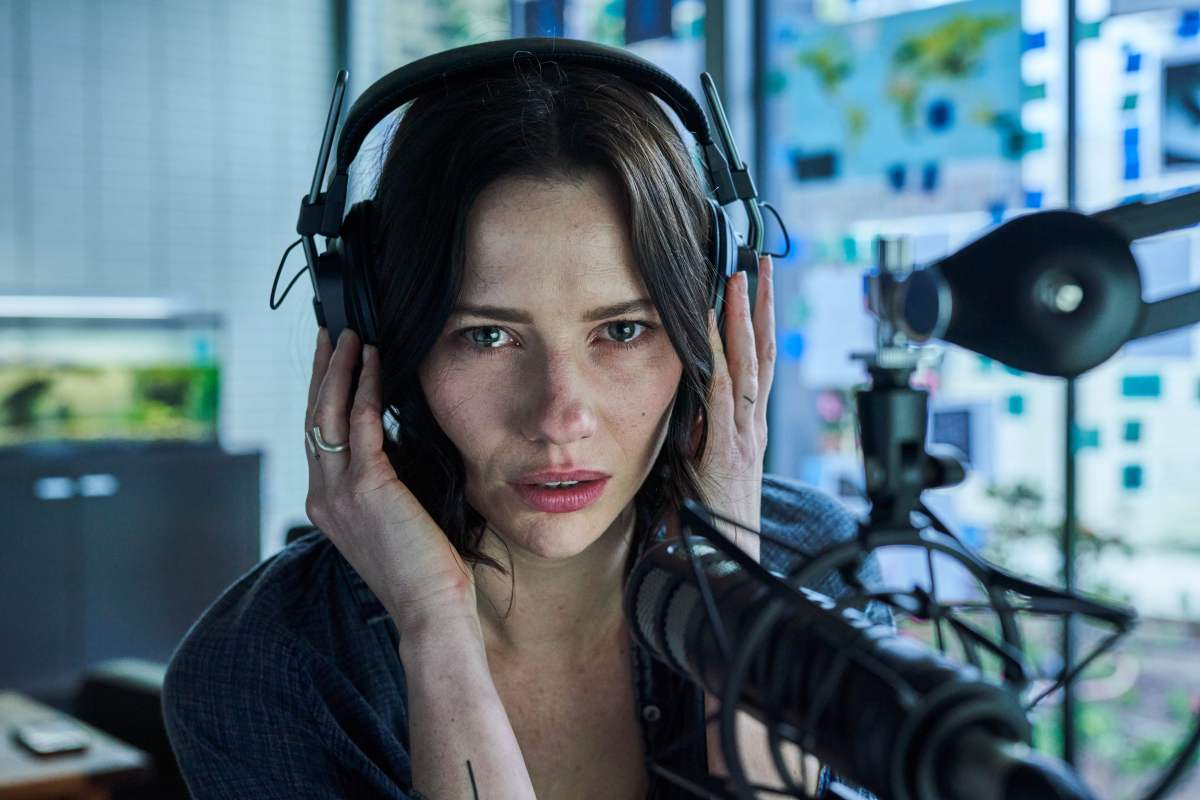If Monolith proves anything, it proves we are witnessing the rise of great films about podcasting. Preceded only by a short list that includes Halloween (2018) and mystery-thriller flick Vengeance (2022), Monolith stands out for a number of reasons, but mostly because of director Matt Vesely’s choice to focus on the isolating experience of being a modern content creator.
Monolith tells the story of a recently disgraced journalist – known only as The Interviewer (Lily Sullivan) – who has turned to hosting and producing an ‘unexplained mysteries’ style podcast to try and make a new name for herself. Depressed and alone inside her parent’s palatial home, she discovers the existence of a strange ‘black brick’ and becomes increasingly worried that it’s part of a wider conspiracy.
Monolith premiered at the Adelaide Film Festival 2022 and is an Adelaide Film Festival Investment Fund film. It’s also the first film to emerge from Film Lab: New Voices, a feature film development initiative from the SAFC and Adelaide Film Festival, with support from Screen Australia.
The film had its international premiere at SXSW in Austin, Texas, earlier this year, and played most recently at MIFF 2023 and Sydney’s own SXSW festival. It’s now in cinemas nationally from 26 October.
Monolith is releasing relatively quietly across Australian cinemas, and if you haven’t already got wind of the festival buzz surrounding it you might miss your chance to see it. A real shame, too, since this is one of the best Australian horrors of the year (Talk To Me, of course, still trumps).
Read: Talk to Me review: an Australian horror to possess you
I want to tell you a story
Monolith opens on an extreme close-up of a microphone, slowly fading into view as we hear the voice of a man (Damon Herriman) telling a story that becomes increasingly non-sensical and paranoid. With this slow-burn introduction, Vesely sets the creeping pace and tension-filled tone of the film.
After some quick exposition on why she lost her previous job, we are introduced to the person listening to the story, played by Sullivan, the single on-screen performer of Monolith. She effortlessly holds our attention as The Interviewer for the entire film. Every interaction she has with other characters is via phone calls where we only hear the others’ voices and never see their faces.
Screenwriter Lucy Campbell’s script is extremely compelling, with a cast of voice actors bringing the wider world outside The Interviewer’s home office to life via increasingly intriguing exchanges. What exactly is this ‘black brick’? Why are there so many of them? And what is happening to the people who receive them – do their strange visions and sudden changes of personality equal a mass delusion, or an alien takeover?
It won’t be lost on the audience that ‘black brick’ could also describe a number of modern technological devices, from the iPhone to The Interviewer’s Zoom H6 handheld recording device. The link is certainly intentional, as the film becomes more and more obviously about the ethics of recording vulnerable people and their stories for mass consumption purposes, as well as the privileged position of The Interviewer who sits safely in her parent’s expensive house and edits said recordings into compelling soundbites.
‘Mono’ being a method of sound recording turns the title into a bit of a pun, too. Mono is short for monophonic, meaning one sound – and in the case of modern sound recording, it means the audio goes through a single channel. An apt metaphor, as all of the unique stories being told by these interviewees in Monolith get condensed into one narrative: The Interviewer’s. Only she can decide what makes the final cut and how their ‘characters’ will be portrayed in the Beyond Believable podcast she hosts.
Read: Saltburn review: Fennell’s film is wicked fun
The truth will out
Monolith is expertly shot, turning a narrative about an audio-only medium into an audiovisual feast. Michael Tessari’s tight cinematography adds to the alienating feel of The Interviewer’s headquarters, and makes the expansive rooms feel increasingly claustrophobic as the mystery unravels.
Perhaps predictably, the character arc of The Interviewer goes from her deeming her interview subjects insane to her succumbing to the intrigue herself, all the while isolated from friends, family and society at large. Her groceries are delivered to her doorstep, and as her window fills up with printed emails, biometric scans, post-it notes and photos, so her sink fills up with dirty dishes, discarded meals and cigarette butts. In TV, Monolith would be deemed a ‘bottle episode’. It’s a well-realised single-set piece, but the gimmick may grow old with some viewers.
Though it is a ‘slow-burn’, I never once found the pace of Monolith to be dragging, and the twists and turns genuinely excited and surprised me. There is a real gasp-out-loud moment towards the end, too.
Releasing just in time for Halloween, Monolith should absolutely make your must-watch horror list of the year.
Monolith is in Australian cinemas from 27 October.
Actors:
Lilly Sullivan
Director:
Matt Vesely
Format: Movie
Country: Australia
Release: 27 October 2022





